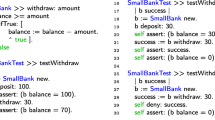Abstract
Single inheritance often forces developers to duplicate code and logic. This widely recognized situation affects both business code and tests. In a large and complex application whose classes implement many groups of methods (protocols), duplication may also follow the application’s idiosyncrasies, making it difficult to specify, maintain, and reuse tests. The research questions we faced are (i) how can we reuse test specifications across and within complex inheritance hierarchies, especially in presence of orthogonal protocols; (ii) how can we test interface behavior in a modular way; (iii) how far can we reuse and parametrize composable tests.
In this paper, we compose tests out of separately specified behavioral units of reuse —traits. We propose test traits, where: (i) specific test cases are composed from independent specifications; (ii) executable behavior specifications may be reused orthogonally to the class hierarchy under test; (iii) test fixtures are external to the test specifications, thus are easier to specialize. Traits have been successfully applied to test two large and critical class libraries in Pharo, a new Smalltalk dialect based on Squeak, but are applicable to other languages with traits.
Access this chapter
Tax calculation will be finalised at checkout
Purchases are for personal use only
Preview
Unable to display preview. Download preview PDF.
Similar content being viewed by others
References
ANSI. American National Standard for Information Systems—Programming Languages—Smalltalk, ANSI/INCITS 319-1998 (1998)
Beck, K.: Simple Smalltalk testing: With patterns, http://www.xprogramming.com/testfram.htm
Black, A.P., Schärli, N.: Traits: Tools and methodology. In: ICSE (2004)
Black, A.P., Schärli, N., Ducasse, S.: Applying traits to the Smalltalk collection hierarchy. In: OOPSLA, vol. 38, pp. 47–64 (2003)
Cassou, D., Ducasse, S., Wuyts, R.: Traits at work: the design of a new trait-based stream library. Journal of Computer Languages, Systems and Structures 35(1), 2–20 (2009)
Cook, W.R.: Interfaces and specifications for the Smalltalk-80 collection classes. In: OOPSLA, vol. 27, pp. 1–15. ACM Press, New York (1992)
Dedecker, J., Van Cutsem, T., Mostinckx, S., D’Hondt, T., De Meuter, W.: Ambient-oriented programming in ambientTalk. In: Thomas, D. (ed.) ECOOP 2006. LNCS, vol. 4067, pp. 230–254. Springer, Heidelberg (2006)
Ducasse, S., Gîrba, T., Wuyts, R.: Object-oriented legacy system trace-based logic testing. In: European Conference on Software Maintenance and Reengineering (CSMR 2006), pp. 35–44. IEEE Computer Society Press, Los Alamitos (2006)
Flatt, M., Finder, R.B., Felleisen, M.: Scheme with classes, mixins and traits. In: AAPLAS (2006)
The Fortress language specification, http://research.sun.com/projects/plrg/fortress0866.pdf
Godin, R., Mili, H., Mineau, G.W., Missaoui, R., Arfi, A., Chau, T.-T.: Design of class hierarchies based on concept (Galois) lattices. Theory and Application of Object Systems 4(2), 117–134 (1998)
Ingalls, D., Kaehler, T., Maloney, J., Wallace, S., Kay, A.: Back to the future: The story of Squeak, a practical Smalltalk written in itself. In: OOPSLA, pp. 318–326. ACM Press, New York (1997)
LaLonde, W., Pugh, J.: Subclassing ≠ Subtyping ≠ Is-a. Journal of Object-Oriented Programming 3(5), 57–62 (1991)
Meszaros, G.: XUnit Test Patterns – Refactoring Test Code. Addison-Wesley, Reading (2007)
Renggli, L.: Magritte — Meta-described web application development. Master’s thesis, University of Bern (2006)
Author information
Authors and Affiliations
Editor information
Editors and Affiliations
Rights and permissions
Copyright information
© 2009 Springer-Verlag Berlin Heidelberg
About this paper
Cite this paper
Ducasse, S., Pollet, D., Bergel, A., Cassou, D. (2009). Reusing and Composing Tests with Traits. In: Oriol, M., Meyer, B. (eds) Objects, Components, Models and Patterns. TOOLS EUROPE 2009. Lecture Notes in Business Information Processing, vol 33. Springer, Berlin, Heidelberg. https://doi.org/10.1007/978-3-642-02571-6_15
Download citation
DOI: https://doi.org/10.1007/978-3-642-02571-6_15
Publisher Name: Springer, Berlin, Heidelberg
Print ISBN: 978-3-642-02570-9
Online ISBN: 978-3-642-02571-6
eBook Packages: Computer ScienceComputer Science (R0)




